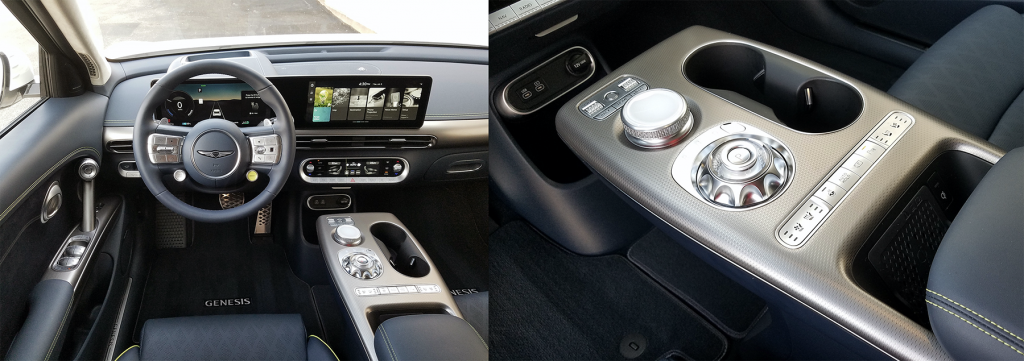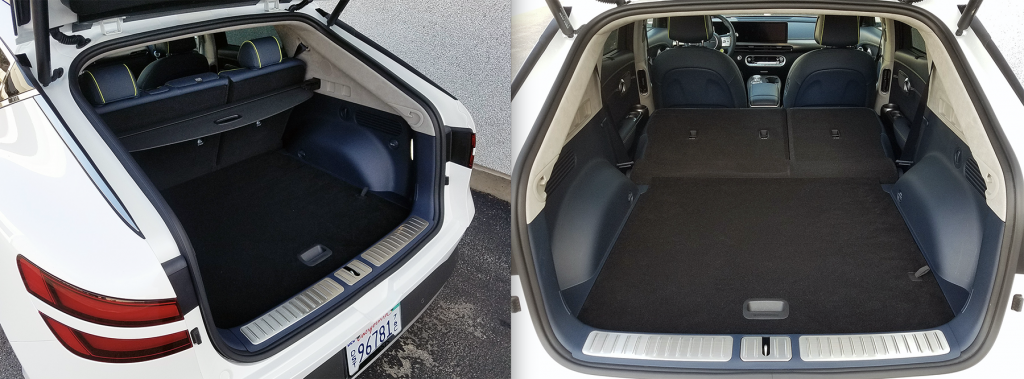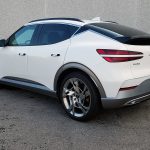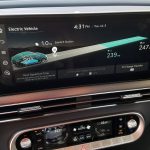

2023 Genesis GV60 Performance
Class: Electric Vehicle
Miles driven: 348
Battery capacity: 77 kWh
| CG Report Card | |
|---|---|
| Room and Comfort | B+ |
| Power and Performance | A |
| Fit and Finish | A |
| Fuel Economy | A |
| Value | A- |
| Report-card grades are derived from a consensus of test-driver evaluations. All grades are versus other vehicles in the same class. Value grade is for specific trim level evaluated, and may not reflect Consumer Guide's impressions of the entire model lineup. | |
| Big & Tall Comfort | |
| Big Guy | A |
| Tall Guy | A |
| Big & Tall comfort ratings are for front seats only. "Big" rating based on male tester weighing approximately 350 pounds, "Tall" rating based on 6'6"-tall male tester. | |
| Drivetrain | |
| Engine Specs | 429 horsepower |
| Engine Type | Electric motors |
| Transmission | Automatic |
| Drive | All-wheel drive |
EPA-estimate MPGe: 97 city/82 hwy/90 combined
EPA-estimated driving range: 235 miles
Consumer Guide range estimate (ideal conditions): 235 miles
Base price: $67,890 (not including $1095 destination charge)
Options on test vehicle: Uyuni White paint ($575)
Price as tested: $69,560
Quick Hits
The great: Eye-opening acceleration; nicely finished cabin with distinctively luxurious character; ultra-fast charging capability
The good: Decent passenger and cargo room for the size; striking styling inside and out; pleasant ride/handling balance
The not so good: So-so rear visibility; driving range isn’t outstanding; limited availability so far
More Genesis price and availability information
John Biel
How many different ways can you drive Hyundai Motor Company’s compact-crossover EVs without having any of them seem the same? Three seems to be the correct answer—which is lucky, since that’s how many they make.
Model-year 2022 saw the debuts of the Hyundai Ioniq 5 and Kia EV6, and now for 2023 comes the luxury-class Genesis GV60 fashioned from the same corporate E-GMP architecture. Befitting its upscale brand (and the price tags that go with it), the GV60 comes only with higher-output and all-wheel-drive powertrains and additional amenities. However, there are some sacrifices of utility in the name of style, and anyone who has spent any time in the Ioniq 5 and EV6 can spot similarities in layout and technology.

Consumer Guide got its first taste of the GV60 as a Performance model, which has a starting price (with delivery) of $68,985—or $9000 more than the Advanced. It is decidedly quicker than the other members of the extended family that CG has tested and it boasts a few technological tricks that ought to be accompanied by eerie theremin music.
Though it is the least traditional Genesis (if “tradition” can be ascribed to a brand that’s existed on its own just since 2017), the GV60 earns its logo wings via styling cues like ribbon headlights and taillights and a pentagonal grille. It will look right at home on showroom floors—though, at first, those floors would only be in select dealerships in California, Connecticut, New Jersey, and New York.
Test Drive: 2022 Hyundai Ioniq 5 Limited

Standard on both GV60 models are facial and fingerprint recognitions that allow you to enter and start the car. Once started, a crystal “bubble” on the center console flips over to expose the drive-range selector dial. Even the glove box marches to its own drummer. Instead of a hinged door over a recessed space, this one is a pull-out drawer.
Unlike their Hyundai and Kia kin, the GV60s come with leather upholstery. Front seats are heated, ventilated, and power-adjustable with 4-way lumbar support; the power tilt/telescoping steering wheel is heated too. AM/FM/satellite/HD radio play through a Bang & Olufsen premium audio system. Apple CarPlay and Android Auto smartphone connectivity is built in (albeit by plug). So are wireless device charging, a “Vehicle-to-Load” generator for powering external devices, active noise control, moonroof, and hands-free automatically opening tailgate. Electronic safety monitors blanket the vehicles, providing everything from forward-collision avoidance to rear cross-traffic collision avoidance.
Test Drive: 2022 Kia EV6 GT-Line

The GV60 Performance starts earning its extra money with 21-inch (in place of 20-inch) alloy wheels, upgraded Nappa seat leather, microfiber suede headliner, “Ergo Motion” driver’s seat (with internal air cells), heated rear seats, and the Genesis Digital Key 2 that works remotely through the driver’s smartphone. It lives up to its name with an electronically controlled suspension, electronic limited-slip differential, and lots more power.

The twin 160-kW motors produce a combined 429 horsepower and 446 lb-ft of torque—115 extra ponies than what’s available in the GV60 Advanced with its total of 234 kW, though torque is the same. However, just like an IndyCar racer with its “push-to-pass” button, the Performance has a “Boost” control on the steering wheel that when pressed hikes horsepower to 483 and torque to 516 lb-ft in a 10-second burst. This top-power GV60 immediately feels quicker and stronger than the lively all-wheel-drive Ioniq 5 and EV6 we tested (both had what basically is the GV60 Advanced powerteam), and hitting the Boost button serves up a palpable gob of go, even when already moving at a highway clip.
Buick Brings Back Electra Name; Wildcat EV Concept Forecasts Design Direction

That power has to take you somewhere, and according to the EPA, somewhere can be 235 miles away before you’d absolutely need to recharge the 77.4-kWh lithium-ion battery. (The less demanding Advanced is rated at 248 miles of range.) In the current grand scheme of things, that’s hardly envelope-pushing—and it is variable. Starting off in “Comfort” drive mode with a full charge and air conditioning on, this driver began his 99.4-mile test stint with an indicated 231 miles of range. At the run’s conclusion, 63 percent of charge but 66.7 percent of range—154 miles—were reported to be left. (Battery-feeding brake regeneration is adjustable all the way up to a level aggressive enough for one-pedal operation.) However, were it to be run in “Sport” or tamer “Eco” modes, respective range projections were 149 and 158 miles. A full 240-volt “Level 2” charge is said to take about seven hours, but an 800-volt DC “fast charge” is claimed to require just 18 minutes to get the battery from 10 to 80 percent full.
The GV60 has the same 114.2-inch wheelbase as the Kia EV6 but it is 6.5 inches shorter overall—indeed, it is the shortest of the Hyundai Motor EV trio. It rides smoothly and handles well, with the variable suspension putting a touch more starch in the road manners when dialed into Sport mode. Inside, it shaves off some passenger-compartment volume in exchange for a little extra cargo room. Its 54.7 cubic feet of space behind the front seats is the second-best figure in the family. However, 24 cubic feet behind the 60/40-split rear seats is the skimpiest of the lot—blame the soft slope of the tailgate for that.
Seating—with adult-friendly legroom yet good but not great headroom—and overall in-cabin storage space are about the same as in the Kia and Hyundai. All make use of an overhanging center console, albeit with highly individualized trim and control placements. The GV60 has a small-capacity console cubby but the underside of the console is a long open storage space. The sweeping screen with the side-by-side 12.3-inch driving-gauge and infotainment displays is much like that in the lesser brands’ models, but the GV60’s graphics are all its own. Infotainment choices have a “table of contents” look and can be swiped from side to side in order to access all categories.
The GV60 is the first pure-electric Genesis. It is a good first effort that takes advantage of what the corporation has already done, then improves on it.
Test Drive: 2021 Volvo XC40 Recharge

2023 Genesis GV60 Performance Gallery
Click below for enlarged images
2023 Genesis GV60
2023 Genesis GV60















